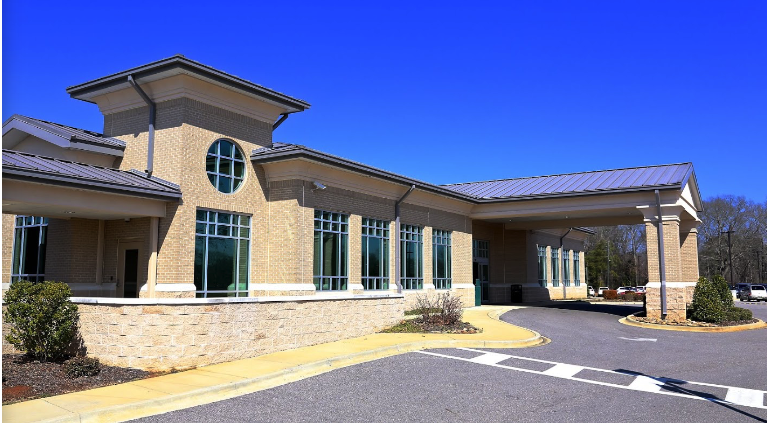Alabama rural hospitals are in crisis. According to Alabama Health Matters (October 2018) 12 have closed since 2011 and 75% are operating in the red. High uninsured patient rates plague Alabama’s rural areas according to a Georgetown University report quoted in Alabama Today, indicating that small towns and rural areas have among the highest rates of uninsured low-income adult citizens in the country.
As of Jan. 2019, 94 rural hospitals have closed nationwide since 2010, with more than 120 and counting closed since 2005. Right now, 673 additional facilities are vulnerable and could close, representing more than one-third of rural hospitals in the U.S. according to the National Rural Health Association (NRHA). 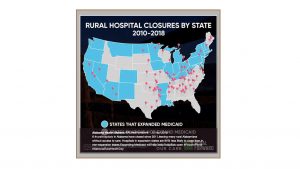
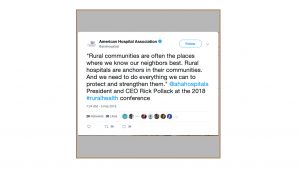 American Hospital Association CEO Rick Pollack said at the 2018 rural health conference “rural communities are often the places where we know our neighbors best. Rural hospitals are anchors in their communities. And we need to do everything we can to protect and strengthen them.”
American Hospital Association CEO Rick Pollack said at the 2018 rural health conference “rural communities are often the places where we know our neighbors best. Rural hospitals are anchors in their communities. And we need to do everything we can to protect and strengthen them.”
The Alabama Hospital Association reports that nearly 50 percent of Alabamians live in rural areas and rural health providers play an important role in addressing healthcare issues throughout Alabama. Not only are rural hospitals the bedrock of healthcare for a community the NRHA Advocacy group has pointed out the importance of a vibrant healthcare system to the economic growth of an area.
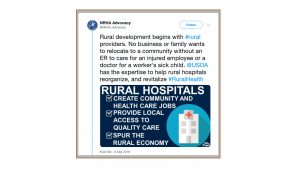
No business or family wants to relocate to a community without an available ER to care for an injured employee or a doctor for a worker’s sick child.
A recent report in Business Alabama highlighted issues with struggling rural hospitals and assistance that is being provided to many of them by the UAB Health System. UAB is attempting to help with the administrative equivalent of a house call.
In late 2017 and early 2018, the UAB Health System entered into management agreements with three rural hospitals in the state. Through these affiliations, UAB comes in and assists with the overall facility operations, including having two members on each hospital board.
 While many rural hospitals are on life support with outside management agreements and are struggling to stay afloat Bibb Medical Center (BMC) is healthy and growing.
While many rural hospitals are on life support with outside management agreements and are struggling to stay afloat Bibb Medical Center (BMC) is healthy and growing.
In 2018 alone BMC reported $2.4 Million in capital improvements to their facilities with new medical equipment, renovations to the nursing home facilities and additions to senior living facilities on their Bibb County campus.
BMC reports that they provided over $3.1 Million in Charitable and Uncompensated medical care to the community in 2018. According to Jami Carlee at Bibb Medical Center “recent statistical data shows there are more than 4,000 uninsured persons within our service area within Bibb County. We see patients regardless of their ability to pay. Medicaid expansion would benefit us greatly.”
Bibb Medical Center has served Bibb County since first opening October 4, 1959, with original funding under the 1946 Hill-Burton Act. Alabama Senator Lister Hill, a well remembered stalwart legislator from Montgomery co-authored landmark legislation that was enacted under the Harry S. Truman administration. The Hill-Burton Act provided federal funding that built community hospitals all over the United States in post World War II economic boom times.
Today Bibb Medical Center is owned and operated by the Bibb County Health Care Authority(BCHCA). BCHCA is a public non-profit corporation that owns and operates Bibb Medical Center and Bibb Medical Center Nursing Home. The original hospital board re-incorporated as a health care authority in 1998 under State laws that allowed it to reorganize from its original format.
Bibb Medical Center has weathered changes brought on by the 2010 version of the Affordable Health Care Act and continues to experience steady growth while battling the challenges. Here in Bibb County we are fortunate to have:
- A vibrant 35 bed acute care medical facility with a 131 bed skilled care nursing home facility
- 24×7 Emergency Room – 17,000 treated through ER in 2018
- Family Practice, Dental, & Specialty Clinics on campus
- Labor & Delivery Unit, Over 200 deliveries since opening the unit in 2016
- AmServ, providing countywide ambulance service
- Cahaba Trace Senior Living, 110 Seniors consisting of congregate and independent living units – 100% occupancy + waiting list
- 1/2 mile outdoor walking-exercise track
According to the 2018 Community Impact Report just released by CEO Joseph Marchant here are some of the measures of Economic Impact contributed to the local economy by Bibb Medical Center in 2018:
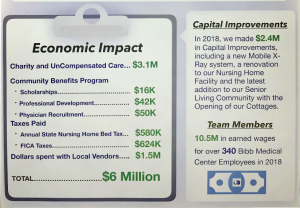
SUMMARY
The Bibb Voice sat down with Bibb Medical Center CEO Joseph Marchant to discuss the reasons Bibb Medical Center has managed to survive when so many other community hospitals in Alabama are at risk or failing.
Marchant pointed out several reasons. “First, BMC is an independently owned community hospital. We keep all dollars in the community. We make all decisions with local Board members from within our own community. Many of the hospitals that have been forced out of business were operated by for-profit companies under management contracts or situated on land owned by outside investors. As a result of these business arrangements some of those failed hospitals had high overhead costs and expenses that Bibb Medical does not have” said Marchant. “Bibb Medical Center is totally under local control; we are managed by a local Board of Trustees, and we do not have outside management costs.”
Marchant pointed out that the occupancy rates for the acute care and the skilled nursing care rank among the highest in the State. The private pay cost for skilled nursing home care ranks among the lowest in the State, averaging $800 per month less than nearby counties and significantly lower than metropolitan areas. The 131 bed skilled nursing home facility usually operates with a waiting list according to Marchant.
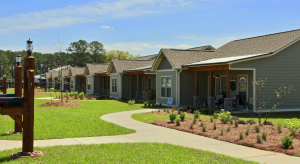
The retirement community, Cahaba Trace Senior Living, has a 100% occupancy and a waiting list. 20% of the residents of Cahaba Trace came from outside of Bibb County, choosing to live in facilities here in Bibb County.
Marchant attributes part of BMC’s success to diversification and adds “the secret sauce is the more we diversify the more we gain. We have used revenues from our high occupancy rates in other areas to be able to offset Charity and Uncompensated Care costs. In 2018 those costs for BMC exceeded $3 Million.”
Bibb Medical Center is guided by a Board of Trustees consisting of local trusted members of the entire county. There has been very little turnover among the Board. Only recently did Hugh Edmonds and Jim Oakley retire from their positions on the Board of Trustees and were honored by Director Emeritus positions created for their more than 25 valuable years of service.
The Board of Trustees hires the CEO and then the Executive is responsible for hiring and directing his own management team according to Board Chairman Brent Belcher. “The Board of Trustees provides oversight, vision and direction” said Belcher.
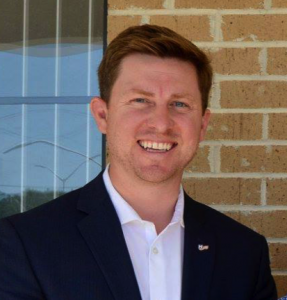
Joseph Marchant has been CEO of Bibb Medical Center since 2011. He followed Terry Smith who led the hospital for 34 years as CEO. There has been stable management at Bibb Medical Center for long periods of time and Bibb County has obviously benefitted from good leadership and good management.
In turbulent times Bibb Medical Center stands out. We wish you the best and continued success for 2019.
The Bibb Voice.


